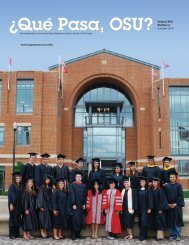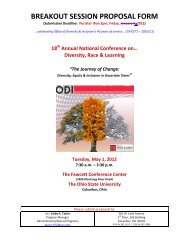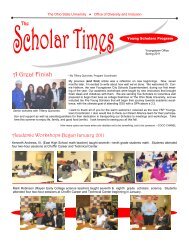“Cus<strong>to</strong>mers Also Bought…”How Readers Connect Gay Chicano Writers on Amazon.comBy Doug Bush, PhD Candidate, Department of Spanish and PortugueseWhether for school or pleasure, manyof us have become accus<strong>to</strong>med <strong>to</strong> buyin<strong>go</strong>ur books online. Indeed, I normally turn<strong>to</strong> Amazon.com first because I can findvirtually anything I’m looking for, manytimes in a variety of formats (physicalcopy, Kindle edition, used, etc.), and theyarrive quickly. Sometimes I find things thatI wasn’t looking for, thanks <strong>to</strong> dynamicsearch results that display what othercus<strong>to</strong>mers who purchased my item alsobought. While many online book retailersdisplay lists of items frequently purchased<strong>to</strong>gether, Amazon is unique in displayinghow individual authors are connectedthrough cus<strong>to</strong>mer purchases. When Ibuy a work such as Ri<strong>go</strong>ber<strong>to</strong> González’sButterfly Boy, my previous purchases influencewhich authors the next cus<strong>to</strong>mer seeson González’s Author Page. For researcherslike myself, these connections offernot only a unique opportunity <strong>to</strong> see howreaders connect authors, but they alsoprovide new ways of approaching longerstanding research questions.I came <strong>to</strong> my current project hoping<strong>to</strong> uncover how gay Chicanoauthors have formed authorialcommunities and shared identities,much like their ChicanaFeminist counterparts havedone over the past severaldecades. Chicanas saw theirvoices shut out of the broaderChicano movement of the1960s and 1970s, which is whythey worked <strong>to</strong>gether <strong>to</strong> createa space <strong>to</strong> express their subjectivities.This was particularlyimportant for queer Chicanaswho did not see themselvesreflected in broader feminist orqueer movements, includingnow well-known names suchas Cherríe Moraga and GloriaAnzaldúa.As other researchers haveexplained, gay Chicano writersdid not follow the same pathas Chicana feminists, and havebeen subject <strong>to</strong> some harshcriticism because of it. In herseminal essay “Queer Aztlán,”Moraga writes that her queer brothers wereable <strong>to</strong> hide behind their gender and thusstill the dominant voices in the Chicanocommunity. Here, she cites well-knownChicano authors Arturo Islas and RichardRodriguez as particular examples. While wecan debate Moraga’s reasoning, it was notuntil the late 1990s that gay Latino authorsbegan <strong>to</strong> create the sorts of unifying collectionsthat Chicana and other feministsof color had produced almost two decadesearlier in This Bridge Called My Back (1981)and Cuen<strong>to</strong>s: S<strong>to</strong>ries By Latinas (1983).Nevertheless, even considering theseworks, which include Bésame Mucho (1999)and Virgins, Guerrillas and Locas (1999), aslate as 2010, Ri<strong>go</strong>ber<strong>to</strong> González wrote thatgay Latinos have still not formally coalescedin<strong>to</strong> the coherent community that theirChicana counterparts did decades earlier.In my current project, I want <strong>to</strong> movebeyond the idea of gay Chicano authorscreating literary communities and identities,and instead focus on the role of thereader. I move past the established generationof gay Chicano authors, includingArturo Islas, Ri<strong>go</strong>ber<strong>to</strong> Rodriguez, JohnRechy, and Michael Nava, and <strong>to</strong>ward thenext generation—Alex Espinoza, Ri<strong>go</strong>ber<strong>to</strong>González, and Manuel Muñoz—who haveall published mostly within the past decade.Espinoza released his first novel, Still WaterSaints, in 2007, and his second, The Five Actsof Die<strong>go</strong> León in March of 2013. Muñoz haspublished two very well received collectionsof short s<strong>to</strong>ries, Zigzagger (2003) andThe Faith Healer of Olive Avenue (2007), andthe recent novel What You See in the Dark(2011). González, meanwhile, may be themost prolific gay Latino author of his age.His works include collections of poetry,short s<strong>to</strong>ries, a novel, an au<strong>to</strong>biography,children’s books and novels for gay Latinoadolescents, with two more titles slated forrelease in 2013. His most well-known workis the au<strong>to</strong>biography Butterfly Boy (2006),which is also consistently his best-sellingbook on Amazon, and one of the few gayChicano biographical works on the market.While González and Muñoz in particularhave been far more open in expressingtheir sexualities in their literature thanmany of the earlier generation of gayChicano authors, they still have not formallycoalesced in<strong>to</strong> the same type of communityas the Chicana Feminists. Instead ofrehashing this point, this project insteadturns <strong>to</strong>ward the reader, and how they mayform communities of authors. Amazon.com is critical in this research because i<strong>to</strong>ffers a world of insight that we have neverhad before. When looking up a book, theweb<strong>site</strong> displays of list of books under“Cus<strong>to</strong>mers Who Bought This Item AlsoBought,” while author pages list connectedwriters under “Cus<strong>to</strong>mers Also BoughtItems By.” Our buying patterns decide theserankings—if I purchase Sandra Cisneros’best-selling The House on Man<strong>go</strong> Street andlater buy Muñoz’s Zigzagger, my clicks helpdetermine how the next cus<strong>to</strong>mer seesthese authors connected.I decided <strong>to</strong> focus solely on Amazonfor a number of reasons: it is now thelargest bookseller in the country, it offersa wealth of insight in<strong>to</strong> buying patterns,and importantly, the company does notposition books based on who publishedthem. In a traditional s<strong>to</strong>re such as Barnes6
& Noble, Espinoza’s Still Water Saints, publishedby Random House, would have anobvious advantage in positioning overGonzález’s novel Crossing Vines, printed bythe University of Oklahoma Press. In fact,we would probably be hard-pressed <strong>to</strong> findCrossing Vines in any of these types of largechains. In this sense, Amazon has actedas a great equalizer where the idea of thecybercommunity—readers connectingwith other readers online—has becomefar more important than the power ofpublishers.To see how readers have connectedEspinoza, González, and Muñoz, I trackedthe names of the 16 authors appearingunder their “Cus<strong>to</strong>mers Also BoughtItems By” list for four months in late 2012.As I do not have access <strong>to</strong> precise salesdata, I assumed that the rankings werestrongly correlated <strong>to</strong> sales—while thenames appearing at the <strong>to</strong>p of the listtended <strong>to</strong> be static, there was much moremovement <strong>to</strong>ward the bot<strong>to</strong>m of the list.I assigned each a weighting according <strong>to</strong>their position on the list, and the numberof times that they appeared across the 16weeks that I collected data. It would bepreferable <strong>to</strong> obtain data over a longerperiod of time, but this is an on<strong>go</strong>ingproject that hopes <strong>to</strong> capture the dynamicsof continuing consumer habits. Overall, theresults not only revealed that readers doindeed connect Espinoza, González andMuñoz, but also offered keen insights inthe Latina/o book market in general. I want<strong>to</strong> note that it was more difficult <strong>to</strong> arrive atconclusions from Espinoza’s data, perhapsbecause he has published only one novel<strong>to</strong> this point. I expect his results <strong>to</strong> becomefar more dynamic after the release of Die<strong>go</strong>Leon.It appears that readers have formedsome type of cybercommunity of thesethree authors even though they have notformally worked <strong>to</strong>gether in a collectionlike Chicana Feminist works Cuen<strong>to</strong>s orThis Bridge. Muñoz was highest weightedauthor on Espinoza’s list, and ranked thirdfor González. González ranked fifth onMuñoz’s list, and appeared on Espinoza’slist during the final data collection point. Ifwe compare these results <strong>to</strong> the first generationof gay Chicano authors, we see a fascinatingchange: there are few links amongthe most prominent names of this generation,including Islas, Rodriguez, Rechy, andNava. It does not yet appear that readersare connecting these two generations—while Islas appears on both the lists ofMuñoz and Espinoza, others are noticeablyabsent. However, readers are connectingEspinoza, González and Muñoz with otherqueer artists, Latina/o and not, includingDaniel Alarcón, Leslea Newman, AliciaGaspar de Alba, and Edwidge Danticat.An important question for further investigationis why readers are making thesecross-ethnic queer connections, but notcross-generational gay Chicano ones.While I primarily collected data onEspinoza, González and Muñoz, the resultsalso offered some interesting insightsin<strong>to</strong> the Latina/o book market as a whole.Analyzing this market can be difficultbecause it is hard <strong>to</strong> come by exact salesfigures. For example, we know that SandraCisneros and Junot Díaz are best-sellingauthors, but how do others fit in? Duringmy tracking of Amazon’s <strong>to</strong>p 20 entries of“Hispanic American Best Sellers,” Cisneros’Man<strong>go</strong> Street and Díaz’s Oscar Wao and ThisIs How You Lose Her had a lock on the <strong>to</strong>pthree positions, while other familiar namessuch as Cristina García and Julia Álvareztypically rounded out the <strong>to</strong>p 10. The onlybook by a new author that consistentlyappeared on this list was Justin Torres’ Wethe Animals, released in 2011. Perhaps notsurprisingly, both González and Muñozwere very strongly connected <strong>to</strong> these <strong>to</strong>pselling authors and overall, most of theauthors on their lists, as well as Espinoza’s,were other Latino artists. Here is where wesee an interesting divide: Latina/o <strong>to</strong>p-sellers,including Cisneros, Díaz and García, arealso connected <strong>to</strong> other Latina/o authors,but also <strong>to</strong> well-known names such as ToniMorrison, Louise Erdrich, and Alice Munro.This likely shows that they have achievedcross-cultural, mass market appeal, somethingthat has so far eluded lesser knownauthors such as Espinoza, González, andMuñoz. The data suggests that those whobuy the books of the authors that I focus on,at least on Amazon, are probably more avidreaders of Latina/o literature, and not thegeneral public.Unfortunately, the data collected for thelist of books in “Cus<strong>to</strong>mers Who Bought ThisItem Also Purchased” was far less conclusiveand because of this, I ultimately decidednot <strong>to</strong> use it. Here, Muñoz’s <strong>to</strong>p connectionswere frequently <strong>to</strong> his own works, ButterflyBoy’s were <strong>to</strong> other queer biographies,while there was little discernible patternin Still Water Saints. A possible explanationis that the list of authors looks at widerrelationships—connections between themany books of each author—while thelist of books is limited <strong>to</strong> buying patternsbetween specific titles. It may also be preferable<strong>to</strong> use the list of authors because it isless likely <strong>to</strong> influence cus<strong>to</strong>mer decisions.Midway through the study period, Amazonmoved this feature from the bot<strong>to</strong>m ofeach book page <strong>to</strong> the individual authorpage, meaning that fewer cus<strong>to</strong>mers arelikely <strong>to</strong> see it. In this way, the list of authorsbecomes less circular in nature—cus<strong>to</strong>mersare less likely <strong>to</strong> click on author namesbecause they’re on the list, thus reinforcingthe names already there.The implications of this emerginggay Chicano cybercommunity of authorsare especially important for new writers.Instead of working from outside of a disconnectedcanon, new authors may be able<strong>to</strong> use the connections that readers haveformed between Espinoza, González, andMuñoz, as well as others, <strong>to</strong> position themselveswithin the market. Much of this willdepend upon how Amazon continues <strong>to</strong>collect and interpret our purchasing habitsand, of course, what sorts of books theseauthors continue <strong>to</strong> write.Doug Bush is a 2012-13 LASER/HumantiesFellow. His dissertation, “Selling a Feeling:New Approaches Toward Recent Gay ChicanoAuthors and their Audience” uses narrativeand cognitive theory <strong>to</strong> explore how readersconnect with the works of Alex Espinoza,Ri<strong>go</strong>ber<strong>to</strong> González, and Manuel Muñoz.www.quepasa.osu.edu Spring Semester 2013 7
















